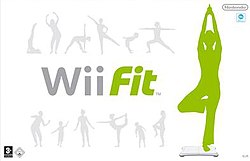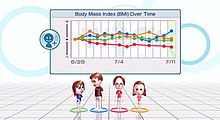This is an old revision of this page, as edited by Duhman0009 (talk | contribs) at 13:49, 18 May 2008. The present address (URL) is a permanent link to this revision, which may differ significantly from the current revision.
Revision as of 13:49, 18 May 2008 by Duhman0009 (talk | contribs)(diff) ← Previous revision | Latest revision (diff) | Newer revision → (diff) Video game| Wii Fit | |
|---|---|
 European box art European box art | |
| Developer(s) | Nintendo EAD |
| Publisher(s) | Nintendo |
| Designer(s) | Shigeru Miyamoto |
| Series | Wii Series |
| Engine | Wii Sports (modified) |
| Platform(s) | Wii |
| Genre(s) | Exergaming |
Wii Fit is a video game developed by Nintendo for the Wii console. Previously revealed under the code name Wii Health Pack, it was announced under its current title at Nintendo's E3 press conference on July 11 2007 by famed video game designer Shigeru Miyamoto. At Nintendo's media briefing, it was demonstrated by Miyamoto, Reggie Fils-Aime and other participants. Like the rest of the Wii Series, Wii Fit integrates Miis into its presentation and gameplay. The game is designed to function with the Wii Balance Board peripheral and is an example of exercise gaming. Wii Fit was released in Japan on December 1 2007, in Europe on April 25, 2008 and May 8, 2008 in Australia. The game is scheduled for release May 19 2008 at the Nintendo World Store and on the May 21 2008 everywhere else in North America.
History

Wii Fit was first revealed as Wii Health Pack, by Shigeru Miyamoto, during a conference in mid-September of 2006. Then described as a "way to help get families exercising together", the game idea had first been included in Miyamoto's original design document for the whole Wii Series, the entirety of which was scribbled onto a sheet of paper.
As with other games designed by Miyamoto, such as Nintendogs, the design of Wii Fit was influenced by the activities in Miyamoto's daily life. Miyamoto states that he and his family had become more health-conscious, going to the gym and tracking their weight. He found that it had become "fun over time to talk about these things", and as weighing yourself "didn't make much of a game", they decided to build games around the idea to mesh with the concept.
In an interview with Game Informer at E3 2007 Miyamoto revealed that Wii Fit had been developed with a "full-scale" team for a year at the time. The Wii Balance Board had been worked on for "almost two years", and was inspired by sumo wrestlers' needing to weigh themselves with two scales.
Gameplay

Wii Fit uses a unique platform peripheral called the Wii Balance Board that can measure a user's weight and their center of gravity, and calculate their body mass index when told the user's height. The game has about 40 different activities, including yoga poses, push ups, and other exercises. Furthermore, Wii Fit allows its players to compare their fitness by using Wii Fit's own channel on the Wii Menu.
Wii Fit tracks a user's "Wii Fitness Age" through a daily body test basing the result on the user's current age, weight, and athletic ability.
According to Shigeru Miyamoto when speaking to IGN during an interview at E3 2007, there are currently no plans to integrate any WiiConnect24 functionality into Wii Fit. He did note, however, that there could be possibilities to take advantage of the WiiConnect24 in the future, such as using the service to keep in contact with a doctor to help with rehabilitation, or with a fitness specialist to help with training exercises.
Activities
Training on Wii Fit is divided into four categories: aerobic exercise, muscle workouts, yoga poses, and balance games. The activities provide a core workout, emphasising controlled movements rather than overexertion. Activities include:
- Yoga Poses
Deep Breathing, Half-Moon, Warrior, Tree, Sun Salutation, Standing Knee, Palm Tree, Chair, Triangle, Downward-Facing Dog, King Of The Dance, Cobra, Bridge, Crocodile Twist, Shoulder Stand
- Muscle Workouts
Single Leg Extension, Press-Up and Side Stand, Torso and Waist Twists, Jackknife, Lunge, Rowing Squat, Single Leg twist, Sideways Leg Lift, Parallel Stretch, Tricep Extension, Arm and Leg Lift, Single Arm Stand, Press-Up Challenge, Jackknife Challenge, Stretch Challenge
- Aerobic exercise
- Jogging, in two formats: fixed distance, and fixed time.
- Step aerobics - Basic, Plus & Free
- Hula Hoop- Basic and super.
- Jogging 1 & 2 Player, Round the 3D Island of Wiifity
- Rhythm boxing - similar to step aerobics but including the Wii Remote and Nunchuk to throw punches.
- Balance games
- Ski jumping
- Ski and snowboard slaloms.
- Heading soccer balls.
- Table tilt - Where the player shifts their balance to get balls into holes.
- Tightrope tension - The player must cross a tightrope avoiding the snapjaws.
- Balance Bubble - The player attempts to navigate down a river in a bubble without bursting it on the sides.
- Penguin slide - The player has to catch fish whilst balanced on a piece of ice.
- Zazen - The player must remain motionless whilst looking at a flame.
Some of the games allow the player to watch TV while getting instructions or rhythm through the Wii Remote speaker.
New activities can be unlocked by gaining 'Fit Cash', which is accumulated in a 'Piggy'. Each minute of Fit Cash is equal to the number of minutes doing an activity rather than the number of minutes of overall gameplay. At certain stages, new yoga poses or muscle workouts are unlocked based on the total time spent working out. Being the best at an activity with a 100% score, or playing an activity a certain number of times unlocks more rigorous versions of that activity.
Activity log
Wii Fit also allows a player to keep track of activities outside of the game, which are then added on to the player's activity log, but not included in the daily exercise time. These are divided into three categories:
- Light - guitar, piano, stretching.
- Medium - cleaning, gardening, walking.
- Heavy - sports such as soccer, tennis, swimming.
The time allotted to these are given a multiplier to show how they should affect the player. Light activities are multiplied by 0.5, making them half as effective as medium activities, while Heavy activities are multiplied by 2.
Units
The European Wii Fit release contains support for both imperial and metric units. If the user location is set to the United Kingdom then imperial units are used, with weight shown in the British style of stone and pounds, otherwise metric are used. As of yet there is no way to change the unit set of the game short of changing the locale setting in the Wii Menu.
Reception
Wii Fit has received generally favorable reviews from many magazines and websites, and, as of April 2008, holds an aggregated 81% score on GameRankings. The scores range from as low as 6.8 out of 10 from NGamer UK, who were keen to stress the balance board is "fat with potential" and will eventually become a must-buy to 9.0 out of 10 from Ferrago. IGN gave the UK version a rating of 8.0 out of 10. The Australian version of Wii Fit was given a 7.0 out of 10 from GameSpot. 1UP.com gave Wii Fit a rating of B+.
Sales
Wii Fit sold over a quarter of a million copies in its first week, and despite not being released outside Japan, Wii Fit passed the 1 million sales milestone within one month of its December 1 2007 release. As of March 30 2008, Wii Fit has sold 1.794 million copies in Japan. Prior to release, consumer reaction has also been positive in the United Kingdom, with some retailers having to stop taking pre-orders due to its increasing popularity. Reports in the United Kingdom state that the Wii Fit launch had seen lines form nationwide. Woolworths claimed that the game was also selling at a rate of 90 copies a minute. Nintendo UK have stated they are working hard to ensure that enough stock is available. In its first week of release, Wii Fit was the best-selling video game in the week, topping the all-format chart. Despite the game being sold at a higher price than average (£70, compared to an average of £35-40) it became the UK's sixth fastest selling console title according to ChartTrack/ELSPA and garnered over £16 million in sales. In the United States, pre-launch sales of Wii Fit have been reported to be sold out at retailers Amazon.com, GameStop and Wal-Mart.
References
- "Wii Get Fit in December".
- ^ Phil Elliott (2008-02-20). "Wii Fit set for April release in Europe". GamesIndustry.biz. Eurogamer. Retrieved 2008-04-06.
- ^ "Wii Fit". Nintendo. 2008-03-17. Retrieved 2008-04-06.
- ^ "Nintendo.com - Games - Wii Fit". Nintendo of America. Nintendo. Retrieved 2008-04-06.
- ^ http://www.nintendo.com/whatsnew/detail/aCGsEvMhsMDV-ZuXAXFSF3qHp6Ciwx_M
- "Wi Fit: Exergaming the World," GamePro 235 (April 2008): 19.
- "E3 2007: Feet-on Wii Fit". IGN. 2007-07-12. Retrieved 2007-07-13.
- Stay Fit with Wii Fit "Console Watcher"
- ^ Satoru Iwata. "Part 1 - A Truly Ground-breaking Collection of Games". Nintendo. Retrieved 2007-02-21.
- ^ Parish, Jeremy (2007-07-13). "Miyamoto Roundtable full transcription". Retrieved 2007-07-14.
- ^ Berghammer, Billy (2007-07-18). "Nintendo's Busiest Man: The Shigeru Miyamoto Interview". Game Informer. Retrieved 2007-07-19.
- "E3 2007: Nintendo E3 Media Briefing Live Blog". IGN. 2007-07-11. Retrieved 2007-07-11.
{{cite web}}: Check date values in:|date=(help) - "Upcoming Wii game release dates". GoNintendo. 2007-07-11. Retrieved 2007-07-11.
- ^ "Nintendo E3 2007 - Wii - Wii Fitness". Nintendo. Retrieved 2007-08-02.
- ^ Shigeru Miyamoto (Interviewed) (2007-07-12). E3 2007: Shigeru Miyamoto Video Interview. IGN. Retrieved 2007-07-13.
- http://www.gamerankings.com/htmlpages2/942009.asp
- http://www.computerandvideogames.com/article.php?id=187102
- http://www.gamerankings.com/itemrankings/launchreview.asp?reviewid=932363
- "Wii Fit UK Review". IGN. Retrieved 2008-04-26.
- "Wii Fit for Wii Review". GameSpot. Retrieved 2008-05-08.
- "Wii Fit Review". 1UP.com. Retrieved 2008-05-12.
- "Wii Fit misses out on Japan number 1". GamesIndustry.biz. 2007-12-06. Retrieved 2007-12-06.
- "JAPAN: Wii Fit sells one million". mcvuk.com. Retrieved 2008-01-09.
- "Wii Fit sells 1m in Japan". gamesindustry.biz. Retrieved 2008-01-10.
- Michael McWhertor (2008-04-03). "Simple 2000: The Japanese Software Chart". Kotaku. Retrieved 2008-04-04.
- http://www.telegraph.co.uk/connected/main.jhtml?xml=/connected/2008/04/21/dlwii121.xml
- http://www.videogamer.com/news/25-04-2008-8124.html
- http://www.webuser.co.uk/news/news.php?id=254185
- http://blog.wired.com/games/2008/04/wii-fit-sells-o.html
- http://www.mcvuk.com/news/30373/UK-CHARTS-Wii-Fit-takes-16m-as-it-hits-No1
- http://ap.google.com/article/ALeqM5i2Te_mW_ztXfIWx4AefoobVwlpDwD90MUFI05
External links
- Wii Fit
- Nintendo's E3 page for Wii Fit
- Creation of Wii Fit - Interview with Shigeru Miyamoto and Satoru Iwata
- Press Room File from E3
- Template:Dmoz
| Wii | |||||||
|---|---|---|---|---|---|---|---|
| Hardware | |||||||
| Software and services | |||||||
| Third-party | |||||||
| Wii Menu | |||||||
| Games |
| ||||||